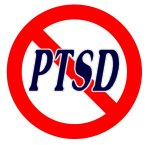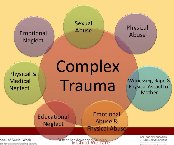Trauma is any event, natural or man-made, that one perceives as a threat to life and survival. . Traumatic events range from the simple fall and life-threatening illness to hurricanes, tornadoes, physical or sexual abuse and war, and they challenge and disrupt our sense of what is right in our world.
When we experience these events, we become fixated or stuck at the point of pain and spend the rest of our lives trying to make sense of it, usually to little or no avail, because there is a disruption of memory consolidation. The event becomes stored in fragments.
In many situations, traumas create a disassociated ego-state as a means of coping with the trauma because the human psyche gets overwhelmed by the event, especially at a young age. This condition makes the information difficult to get at and therapeutic techniques exist that make it possible to access the data. Unfortunately, most are not aware that this has happened.
There are actually two other types of trauma. Secondary or vicarious trauma happens when someone experiences extended exposure to someone who has Post Traumatic Stress Disorder (PTSD). Spouses, significant others, and mental health workers who deal with PTSD clients can develop symptoms of PTSD. Combat zone veterans who do not actually experience combat develop PTSD in this manner because of the constant exposure to the stressors of war.
Accumulated trauma is the other type of trauma that people experience. As the name implies, numerous traumas over time contribute to this condition. This could also include a combination of repetitive traumas, as in the case of emotional abuse (ex. repeatedly being told in some manner that you are not good enough), and major traumas like serious accidents. Emotional abuse is actually much more difficult to treat because there is no one specific event that caused the trauma. It is a build up of traumatic stressors.
Traditional therapy techniques are slow and painful at best, offer some resolution in some cases, and are useless in others. By combining ego-state therapy techniques, such as Gestalt (also known as splits or chair process), with energy therapies such as EFT or TAT, much more complete processing, recovery and integration is accomplished in a shorter time than traditional methods afford, regardless of the source of the trauma.
Symptoms of PTSD
- Flashbacks
- Intrusive Memories
- Exaggerated Startle Response
- Nightmares
- Poor Concentration
- Inability To Make Future Plans
- Hyper Vigilance
- Sleep Disturbances
- Loss Of Interest In Enjoyable Activities
- Feelings W/O Memories
- Feel Out Of Control
- Unable To Maintain Intimate Relationships
If you are experiencing symptoms from the above chart, you may be experiencing Post Traumatic Stress Disorder, or PTSD. If so, Energy Psychology Methods offer the quickest path to resolution!










